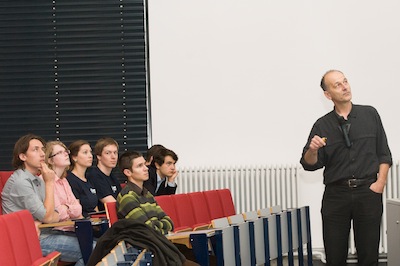Team:KU Leuven/Human Outreach/Seminars
From 2013.igem.org
| Line 40: | Line 40: | ||
<div class="row-fluid"> | <div class="row-fluid"> | ||
<div class="span4 greytext"> | <div class="span4 greytext"> | ||
| + | <img src="https://static.igem.org/mediawiki/2013/7/7a/JohanRobbenSeminar.jpg" alt="prof. Robben at our seminar"/> | ||
| + | <p>Prof. Johan Robben talking at our seminar.</p> | ||
<img src="https://static.igem.org/mediawiki/2013/f/f4/GroningenSeminar.jpg" alt="Groningen at our seminar"/> | <img src="https://static.igem.org/mediawiki/2013/f/f4/GroningenSeminar.jpg" alt="Groningen at our seminar"/> | ||
<p>The iGEM 2013 Team of Groningen presenting at our seminar.</p> | <p>The iGEM 2013 Team of Groningen presenting at our seminar.</p> | ||
| - | |||
| - | |||
</div> | </div> | ||
<div class="span8"> | <div class="span8"> | ||
Revision as of 07:54, 4 October 2013
Secret garden
Congratulations! You've found our secret garden! Follow the instructions below and win a great prize at the World jamboree!
- A video shows that two of our team members are having great fun at our favourite company. Do you know the name of the second member that appears in the video?
- For one of our models we had to do very extensive computations. To prevent our own computers from overheating and to keep the temperature in our iGEM room at a normal level, we used a supercomputer. Which centre maintains this supercomputer? (Dutch abbreviation)
- We organised a symposium with a debate, some seminars and 2 iGEM project presentations. An iGEM team came all the way from the Netherlands to present their project. What is the name of their city?
Now put all of these in this URL:https://2013.igem.org/Team:KU_Leuven/(firstname)(abbreviation)(city), (loose the brackets and put everything in lowercase) and follow the very last instruction to get your special jamboree prize!


Seminars
It is difficult to decisively draw the line between what's human outreach and what is human practices. Especially the symposium we organised falls somewhere in between since an important part was a debate in which the ethical aspects were discussed. It also was a great opportunity to let people encounter iGEM and synthetic biology. We decided to discuss the debate on the ethics part and the scientific seminars and team presentations here. There were two scientific seminars at our symposium, one given by prof. dr. Johan Robben and one by prof. dr. ir. Kevin Verstrepen. The next week we also held a philosophical seminar given by professor of Philosophy Hub Zwart.
Symposium

Prof. Johan Robben talking at our seminar.

The iGEM 2013 Team of Groningen presenting at our seminar.
The organisation of a symposium started with the decision to hold a debate. We hoped to encounter a wide array of valid points on the benefits and dangers of our project and synthetic biology. This also offered a great opportunity for reaching out to the public. In order to make the program more attracting we extended it with two seminars and our project presentation. This opened up the possibility of including other teams so they have a chance to practice presenting their project. We invited all the Benelux teams, but that close to the deadlines, only the team from Groningen could make it for the presentation and Gent for the debate.
The first seminar was given by professor Johan Robben, who is one of our instructors this year and has been for every participation of the KU Leuven in the competition. He currently supervises the new lab for molecular and synthetic biology. His seminar revolved on the basic understanding of living nature and how this eventually evolves into changing nature. This was followed by a seminar of professor Kevin Verstrepen. After a period of scientific research and teaching at the MIT and Harvard professor Verstrepen returned to the KU Leuven where he continues his research about fundamental genetics. The subject of the seminar is related to that: how does DNA coding for new functions come into existence?
After the seminars, the public had gotten a taste for synthetic biology and it was time for us and the delegation of the Groningen iGEM team to present our projects. In short presentations of twenty minutes we explained the content of our project and its uses to the public. After these presentations there was a small break so that everyone could have dinner and then later return to the Pieter De Somer aula for the debate.
Seminar Hub Zwart
On September 26th we organized a seminar and lecture by the Dutch professor of Philosophy Hub Zwart. He is full professor of Philosophy at the faculty of science of the Radboud University Nijmegen, The Netherlands. In 2012 he published an article in Medicine, Health Care and Philosophy, titled: On decoding and rewriting genomes: a psychoanalytical reading of a scientific revolution. The team members read this article and formulated several questions. During the seminar, the iGEM team and professor Zwart analysed the article, the main thesis and arguments, from a philosophical and (exact) scientific viewpoint. The day was concluded with a public lecture by professor Zwart. It was held at the philosophy department of the KU Leuven and was attended by approximately 50 philosophers AND scientists. This get-together between scientists and philosophers to discuss synthetic biology from a psychoanalytical viewpoint is a unique collaboration, reflecting one of the key goals of iGEM : bringing people from different backgrounds together to break down the walls between research communities. More about the psychoanalysis of synthetic biology can be found under human practices.

The poster introducing the lecture by Hub Zwart.
 "
"



